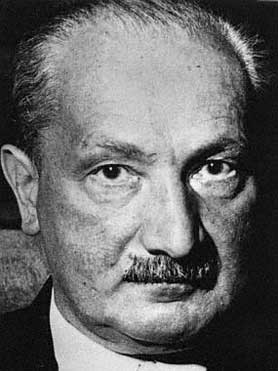As the ego cogito, subjectivity is the consciousness that represents something, relates this representation back to itself, and so gathers with itself.
something, relates this representation back to itself, and so gathers with itself.
Being and time determine each other reciprocally, but in such a manner that neither can the former - Being - be addressed as something temporal nor can the latter - time - be addressed as a being.
But every historical statement and legitimization itself moves within a certain relation to history.
Every man is born as many men and dies as a single one.
If I take death into my life, acknowledge it, and face it squarely, I will free myself from the anxiety of death and the pettiness of life - and only then will I be free to become myself.
 something, relates this representation back to itself, and so gathers with itself.
something, relates this representation back to itself, and so gathers with itself.Being and time determine each other reciprocally, but in such a manner that neither can the former - Being - be addressed as something temporal nor can the latter - time - be addressed as a being.
But every historical statement and legitimization itself moves within a certain relation to history.
Every man is born as many men and dies as a single one.
If I take death into my life, acknowledge it, and face it squarely, I will free myself from the anxiety of death and the pettiness of life - and only then will I be free to become myself.
Language is the house of the truth of Being.
Making itself intelligible is suicide for philosophy.
Man acts as though he were the shaper and master of language, while in fact language remains the master of man.
Man is not the lord of beings. Man is the shepherd of Being.
The German language speaks Being, while all the others merely speak of Being.
The human being is not the lord of beings, but the shepherd of Being.
The human body is essentially something other than an animal organism.
The most thought-provoking thing in our thought-provoking time is that we are still not thinking.
The possible ranks higher than the actual.
Thinking begins only when we have come to know that reason, glorified for centuries, is the stiff-necked adversary of thought.
Time is not a thing, thus nothing which is, and yet it remains constant in its passing away without being something temporal like the beings in time.
Time-space as commonly understood, in the sense of the distance measured between two time-points, is the result of time calculation.
The human being is not the lord of beings, but the shepherd of Being.
The human body is essentially something other than an animal organism.
The most thought-provoking thing in our thought-provoking time is that we are still not thinking.
The possible ranks higher than the actual.
Thinking begins only when we have come to know that reason, glorified for centuries, is the stiff-necked adversary of thought.
Time is not a thing, thus nothing which is, and yet it remains constant in its passing away without being something temporal like the beings in time.
Time-space as commonly understood, in the sense of the distance measured between two time-points, is the result of time calculation.